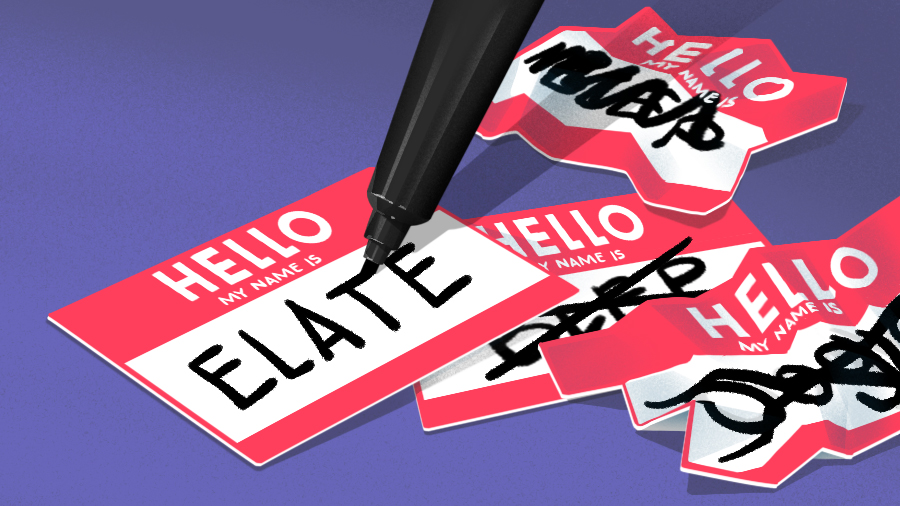Some of the most famous startup success stories feature companies adept at being both serious and ridiculous.
Take two of the four most-valuable American companies: Apple and Google. The first named itself after a fruit and pioneered personal computing. The second picked the silliest-sounding number and revolutionized online search.
Scores of others have also at some time secured large-cap valuations with offbeat names and branding strategies. Yahoo launched the search engine race with a “Chief Yahoo” as CEO. Lyft drivers once adorned their cars with pink mustaches. And Twitter (now X), embraced silly from the start.
Not long ago, startup naming was often a competitive exercise in absurdity. In 2017 and 2018, we devoted columns to tracking the trends.
Then, things got boring.
Not fun anymore
A few years ago, we began to notice a shift toward more staid, serious and spellable names. This accelerated with the pandemic and has persisted in the current AI unicorn era.
Looking at the most heavily funded startups of the year — a list that includes OpenAI, xAI, CoreWeave and Safe Superintelligence — none has a name one could describe as “fun.” It’s as if they had asked an AI chatbot for something that would score hefty investment but amuse no one.
“They don’t have much playfulness,” said Bruno Benedini, a founder of branding consultancy Taillight, regarding the general universe of AI startup names. “You have basically every word you can think of with AI tacked on to the end.”
The sentiment about startup names getting serious is echoed by Michael Carr, co-founder and managing director of Austin, Texas-based consultancy NameStormers. He attributes some of the shift to a perception among founders that “silly, whimsical names aren’t going to get the same traction with venture capitalists.”
Market cycles likely also play into this. In recent quarters, consumer products and services startups have raised a smaller share of total venture funding than has historically been the case. That matters, as these are companies likely to pick edgy names so people will remember them.
All the obvious names are taken
Another factor dampening adoption of many whimsical names is that they’re simply not available.
Today, there are millions of registered trademarks, meaning that most of the obvious, short, real-world names a founder might consider are already taken, per Carr. “In general, it’s a lot harder to come up with a name that cuts through the clutter,” he observed.
To make trademark matters more complicated, founders are also looking for a name that’s viable in multiple countries. And even if they find a humorous option that’s legally available, it might not resonate with some of their audience.
“It’s a little difficult to get names that straddle that line that’s somewhat whimsical, but not so silly that you disregard it,” Benedini said.
Some are sticking with silly
Moreover, while many startups with offbeat names have made it big, there are plenty of failures too. The list of famous venture-backed flops includes such names as Quibi, Washio, Wonga, Juicero, Beepi and Fuzzy, to name a few.
True, startup investors have also made a lot of losing bets on companies with boring names. One advantage, however, is that people are less likely to remember them.
These days, even as offbeat names are less in favor, we do still see some startups going this route. To illustrate, we used Crunchbase data to put together a sample list of 15 such companies founded in the past two years that have raised millions in funding.
Personally, I’m partial to Greptile: memorable, evocative and, so far as I can tell, pretty unique. It doesn’t exactly scream “AI code startup,” but, hey, you can’t have everything.
In a world where AI startups want to stand out for their brilliance, Bland AI is also one to remember. It makes some logical sense as well, given the role AI is expected to play in automating away some of our blander business tasks.
Benedini, meanwhile, favors CopyFrog, an AI-powered content creator that has nothing to do with frogs. (Unless you were specifically seeking frog-related content, I suppose.)
For now, it’s not clear what it will take for weird names to make a comeback en masse. Perhaps the best we can hope is that oddly named startups will raise a ton of money, thus allowing others to feel confident that this can in fact be a viable branding strategy.
Related Crunchbase Pro list:
Related reading:
Illustration: Dom Guzman

Stay up to date with recent funding rounds, acquisitions, and more with the Crunchbase Daily.
 3 months ago
30
3 months ago
30